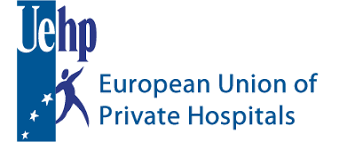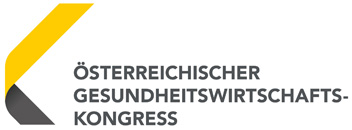Wer Geld mit der Krankheit von Menschen macht, dem kann nicht getraut werden – so wurde es nicht nur hier in Österreich, sondern in ganz Europa leider viel zu häufig reißerisch auf den Punkt gebracht. Ilaria Giannico ist seit 2016 Generalsekretärin des Europäischen Verbandes der Privatkliniken (UEHP). Sie ist davon überzeugt, dass nicht die Trägerschaft einer Klinik von Bedeutung ist, sondern die Versorgungsqualität, die sie ihren Patient*innen bietet. Die Corona-Krise hat in der öffentlichen Wahrnehmung für eine überraschende Wendung gesorgt. Im Interview zeichnet Frau Giannico die tragenden Rolle, die Privatkliniken europaweit während der Coronakrise übernehmen und teilt wertvolle Best-Practice-Berichte aus Deutschland und Frankreich.
Dear Ms. Giannico, what role did the private clinics play during the last months of corona-crisis?
From the very beginning of the COVID-19 pandemic, all European private hospitals reported the severity of the virus and, solicited by their national governments, have been fully engaged in the fight against the coronavirus, determined to save lives and to curb the spread of the pandemic. In all countries, ICU beds were made available, all non-urgent procedures were cancelled to make space to the surge of coronavirus patients. All UEHP member hospitals were and still are present and engaged to rise to the task. In addition to shutting down regular operations, private hospitals all over Europe promptly reacted to fight the first wave and prepare to the second one: staff were retrained, the stockpiling of protective equipment and medication was optimized and patient flows of infected and non-infected patients were separated. Above all, however, intensive care beds were significantly increased and centrally recorded for capacity control.
UEHP is engaged in the coordination of actions and in the sharing of relevant information. We have been collecting best practices and good examples from model countries to try to make other governments aware of the fact that supportive measures are possible and are key in this moment if we really want to ensure hospital performance and the safety of European citizens.
Any restriction today will endanger lives tomorrow. Without adequate financial support, the whole healthcare force will be weakened even more. All protective economic measures, national and regional, must be taken to maintain the viability of the health care supply. Hospitals must not be the second victims of the COVID-19 pandemic.
So, most of the private clinics played a supporting role during the crisis. Did that strengthen their image?
Yes, indeed! The unprecedented situation we found ourselves in, showed even more the importance of the private sector in each European country. There has been close collaboration between public and private sector to fight the pandemic because private hospitals are part of the same healthcare system.
The crucial role of the private sector in the fight against the pandemic was recognized by Member States all over Europe. I would like to stress the importance of two financial and legal measures taken by France and Germany which were key for the private sector to keep working efficiently and not to suffer from the huge loss all private hospitals experienced during the crucial months of the pandemic when they had to deprogram all non-COVID activities.
In France, from the start of the crisis, the Minister of Health and the government made a commitment to all hospital sectors – including the private sector – of funding up to 85 % of last year’s revenue. A decree to this effect was published early May. This allowed hospitals to maintain the teams and protect the sector. Given this funding commitment, establishments have kept their teams working without resorting to a partial reduction in the activity. In addition, a bonus of 1 500 euros was provided for public sector employees who have been in contact with Covid patients and 500 euros in the departments least affected by the health crisis.
In Germany, all hospitals, independently of their legal nature, were treated equally. All were under the same order to prepare for the pandemic and all acute hospitals received a 560 euros/day compensation (a bit less for rehabilitation clinics) during the pandemic.
I believe these two examples are best practices which should be replicated in other countries to assure the economic sustainability of the private sector, a sector which has shown its fundamental role and help during the toughest times of the pandemic, as well as its readiness to care the entire population and be at the service of the patients. This financial stability, equivalent to the public sector, helps maintain healthcare performance which can only exist through adequate and innovative funding. Cooperation between different hospital sectors and healthcare actors has enabled all countries to absorb the first waves of the epidemic. The second wave is there and if there is something we have learned from the crisis is that our healthcare systems must be resilient, that is they must be able to adapt and react to new challenges and crisis.
Not only for the private sector, but for health as a whole, the great legacy of facing this pandemic was the identification of the needs for more integrated planning between the public and private sectors; an information system that provides consistent and quality information for decision-making; to develop a national production of critical supplies and the importance of telemedicine.
We need to build a balanced health system that is equally supported by all health actors which should be equally treated.
In your role as managing director of an interest group, you are also a confidante for your members. How can you currently help your members most?
In these times of pandemic and emergency situations, it is key to reflect on existing EU legislation to strengthen healthcare systems in the EU and support and protect frontline healthcare workers while doing their job, putting their own lives at risk. The COVID-19 outbreak is having an unforeseen impact across all EU countries, and it is affecting all layers of society. COVID-19 is reshaping the EU political priorities, strategies, and budgets to get the European Union acting as one single voice. A new area of cooperation has arisen coordinating actions to tackle future health emergencies within the EU.
Last 20 April 2020, on the initiative of our President and the UEHP Board, we sent a letter on the role of the private sector in the COVID-19 pandemic and the future of health to the President of the European Commission, Mrs. Ursula Von der Leyen, the President of the European Parliament, Mr. David Sassoli, and to the EU Commissioner for Health & Food Safety, Mrs. Stella Kyriakides.
All across Europe, all hospitals, public and private, have joined forces to combat the coronavirus crisis, developing new solutions to cope with the unpredictable number of patients suffering from the virus. Representing 20% of all hospital beds in Europe, private hospitals (providing acute care, rehabilitation, and mental health services) have shown their full engagement in the public health response managed by governments in each Member State. Two key words must be stressed: coordination and cooperation, sometimes managed with a certain delay but always effective and relevant, at regional or national level.
UEHP would like to remind the European Commission and the European Parliament of the full involvement of the private health sector in facing this public health threat and engaging all means to succeed. UEHP believes that the current crisis requires new perspectives for a European Health coordination and a major change in scientific and management cooperation. The lack of European initiative exposes national systems to inadequate responses. Too many contradictory voices disclaimed effective communication and practical solutions. Just to name a few of the problems we faced: ICU beds, ventilators, PPE, drug or devices shortage. We are asking the European Commission and the European Parliament to make Health a priority and, as such, define basic rules. Learning from the crisis means to understand that the challenge of the pandemic can only be met by joining all forces in the health care sector. Private hospitals therefore are an indispensable element, carrying a great share of the burden and thus should be acknowledged as partners with equal rights.
UEHP is ready to support new strategic objectives and to propose relevant initiatives, proud of recent engagement for a new common ambition with the European Commission and the European Parliament.



